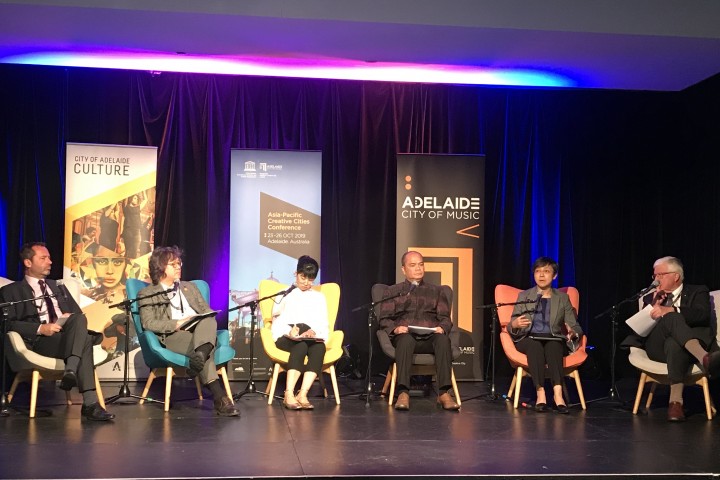
Macao Attended First Asia-Pacific Creative Cities Conference
Macao attended the first Asia-Pacific Creative Cities Conference, which was held in Adelaide, Australia, from 23rd to 26th October. Organised as an initiative of the UNESCO Creative City of Music Adelaide, the conference brought together government officials, cultural and creative industries professionals, and academics, with the aim to outline a vision and strategy for the cooperation among the Creative Cities in the Asia-Pacific region. Macao Government Tourism Office (MGTO) Director Maria Helena de Senna Fernandes spoke at the conference, sharing Macao’s experience in a panel that focused on tourism promotion policies and marketing strategies for Creative Cities.
The first Asia-Pacific Creative Cities Conference attracted around 200 representatives from 20 Creative Cities across Asia-Pacific from all creative fields, including the Creative Cities of Beijing (design) and Shenzhen (design). MGTO Director, and Macao SAR focal point to the UNESCO Creative Cities Network, Maria Helena de Senna Fernandes, was in Australia to attend the event, accompanied by the Head of Training and Quality Management Department of MGTO, Doris Leong.
MGTO Director Senna Fernandes joined a panel with representatives from cities of other creative fields for discussions under the theme ‘Label, Product or More? Understanding Long-term Tourism Policies and Marketing Strategies for Creative Cities’. Director Senna Fernandes elaborated on how the status as a UNESCO Creative City of Gastronomy has a significant influence on Macao’s tourism policies and marketing strategies. She explained that the Creative City of Gastronomy narrative has been fully integrated into Macao’s destination promotion, city’s tourism products and events, as well as on developing cross-field collaborations, along with initiatives to foster sustainable practices in the F&B and related sectors and more, opening a brand new avenue to help transform Macao into a world centre of tourism and leisure.
Representatives from other Asian Creative Cities of different creative fields joining the panel came from Baguio, in the Philippines (crafts and folk art); Bucheon, Korea (literature); Sapporo, Japan (media arts); and Indian Cluster Office (representing, Chennai and Varanasi - music, and Jaipur - crafts and folk art).
The four days’ programme of the first Asia-Pacific Creative Cities Conference featured panel sessions and round tables, among others. Aiming to provide a platform for dialogues and to deepen regional collaborations between Creative Cities in the Asia-Pacific, the conference engaged participants in discussions on how to tap the vast market potential of cultural and creative industries in the region, as well as on how these industries can help create solutions to achieve the United Nations 2030 Agenda for Sustainable Development.
Other themed panel discussions included, ‘Promoting Cultural and Creative Sector Development, Employment, Trade and Investment within the Asia-Pacific Region’, ‘Securing Sustainable Solutions and the Resilience of Cities through Creativity’, ‘Indigenous Arts, Language and Culture in the Asia-Pacific Region’, and more. Representatives from Creative Cities also joined internal meetings of the network, along with study tours and creative showcases to experience Adelaide’s culture and festivals.
MGTO is rolling out initiatives in accordance with the plan to develop Macao as a Creative City of Gastronomy, in which MGTO will organise the annual ‘International Gastronomy Forum, Macao 2020’ on April next year, to bring together Creative Cities from around the world, mainly from the cluster of gastronomy.
UNESCO designates 66 new Creative Cities, 10 in Gastronomy
On 30th October, 66 cities were designated as new member cities of the UNESCO Creative Cities Network. In the field of gastronomy ten new member cites were designated, namely Afyonkarahisar (Turkey), Arequipa (Peru), Belo Horizonte (Brazil), Bendigo (Australia), Bergamo (Italy), Hyderabad (India), Mérida (Mexico), Overstrand Hermanus (South Africa), Portoviejo (Ecuador) and Yangzhou (China). In addition, China’s Nanjing was designated a Creative City of Literature.
The UNESCO Creative Cities Network now counts a total of 246 member cities, coming from all countries and regions with different income levels and populations. The member cities work together towards a common mission: placing creativity and the creative economy at the core of their urban development plans to make cities safe, resilient, inclusive and sustainable, in line with the United Nations 2030 Agenda for Sustainable Development.
